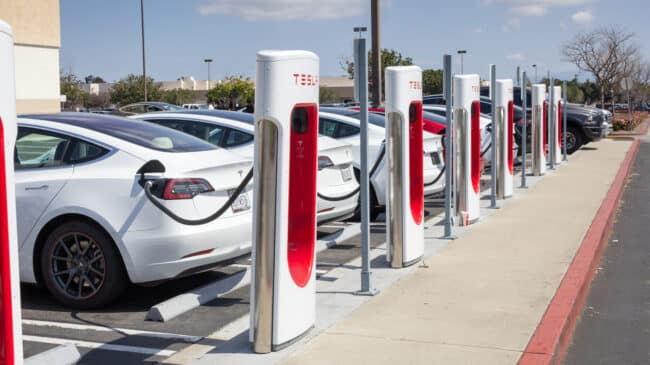Whenever politicians win, they like to use the cliche that elections have consequences. When Democrats won control of the House and the Senate last year, a variety of policies aimed at addressing climate change were expected. But an electric vehicle provision in Congress’ evolving $1.5 to $2 trillion reconciliation bill would undermine their climate change-related efforts in order to provide an unprecedented gift to the United Auto Workers Union. The provision, in Section 136401 of the initial House reconciliation bill, would create a new, extra federal tax credit for buyers of some electric vehicles, who would receive an additional $4,500 tax credit—if they purchase electric vehicles assembled by union labor.
This bill adds $4,500 to the current $7,500 tax credit available for a total of $12,500 potentially available to EV buyers. As the bill stands today an EV must be assembled in the US and with union labor, which would disqualify nonunion automakers such as Tesla and Toyota. In addition, it must use a US-built battery to qualify for the full $12,500 incentive. The bill is part of the broader Democratic-backed budget plan, though it continues to face major hurdles. It’s unclear if this provision will stick as President Biden and others in his party try to work out a compromise on the spending plan.
Back in the 1960s, when Detroit’s Big Three automakers (Chrysler, Ford, and General Motors) assembled nearly all of the cars sold in America, the term auto worker was synonymous with being a United Auto Workers member. By the 1980s, that began to change, as Honda, Nissan, and Toyota introduced popular, mostly better-built cars that became widely popular with drivers. Threatened with new tariffs, however, the Japanese car companies, along with BMW, Mercedes-Benz, Volkswagen, and others began building assembly plants in the United States. But, knowing full well the high costs, restrictive work rules, and strike potential at auto plants located in Michigan, nearly all of these carmakers’ new plants were located in Southeastern states, such as South Carolina and Tennessee. Unlike Michigan, these are “right-to-work” states, with laws that make it harder to form unions.
Today, only two of the 50 electric vehicles that would otherwise qualify for the new tax credit are assembled by union workers (at Ford and GM plants). By comparison, all the rest of the electric vehicles would become considerably more costly to consumers due to the absence of the bonus tax credit.
Every major auto company has more electric vehicle (EV) models in its pipeline, but even U.S. auto companies don’t plan to build most of them in Michigan. Both Ford and GM have announced plans for new EV production facilities in Tennessee, and the non-U.S. companies plan to keep building their vehicles (including EVs) in right-to-work states.
On Sept. 30, 12 of the largest non-U.S. auto companies sent a joint letter to House Speaker Nancy Pelosi (D-CA) and senior House members arguing that this tax credit measure would discriminate against their 131,000 American auto workers at 500 facilities in 36 states. They noted that their companies currently account for 55% of all new vehicle registrations each year.
Cody Lusk, CEO of the American International Automobile Dealers Association, told Politico, “If I want to buy a Volvo made in the US, I wouldn’t get the same benefits as someone who buys from GM in Michigan. The $4,500 credit is a huge amount and makes any non-union vehicles in a market non-competitive.”
That may be an exaggeration, but the proposed tax credit would obviously reduce the sales of electric vehicles made by every company except the Big Three’s models assembled in a handful of states. Policymakers hoping to increase the number of electric vehicles on the road should worry about the unintended consequences of this tax credit proposal. For example, if electric vehicle sales by all of the popular carmakers that would be ineligible for the $4,500 tax credit are cut in half in the coming decades because their EVs look less competitive, by 2050 the overall fraction of electric vehicles in the U.S. personal vehicle fleet could be only 25%, rather than the projected 50%.
A major emphasis of the Democratic Party’s agenda in Congress right now is implementing policies intended to reduce America’s carbon footprint. Making the transition to electric vehicles over the next 30 years is going to be a major element if that goal is successfully reached. Yet, this tax credit prioritizes labor union membership ahead of reducing the country’s carbon footprint. By trying to push buyers to union-assembled cars, Congress risks slowing the shift to electric vehicles and undercutting the carbon reduction goals it is trying to achieve.

